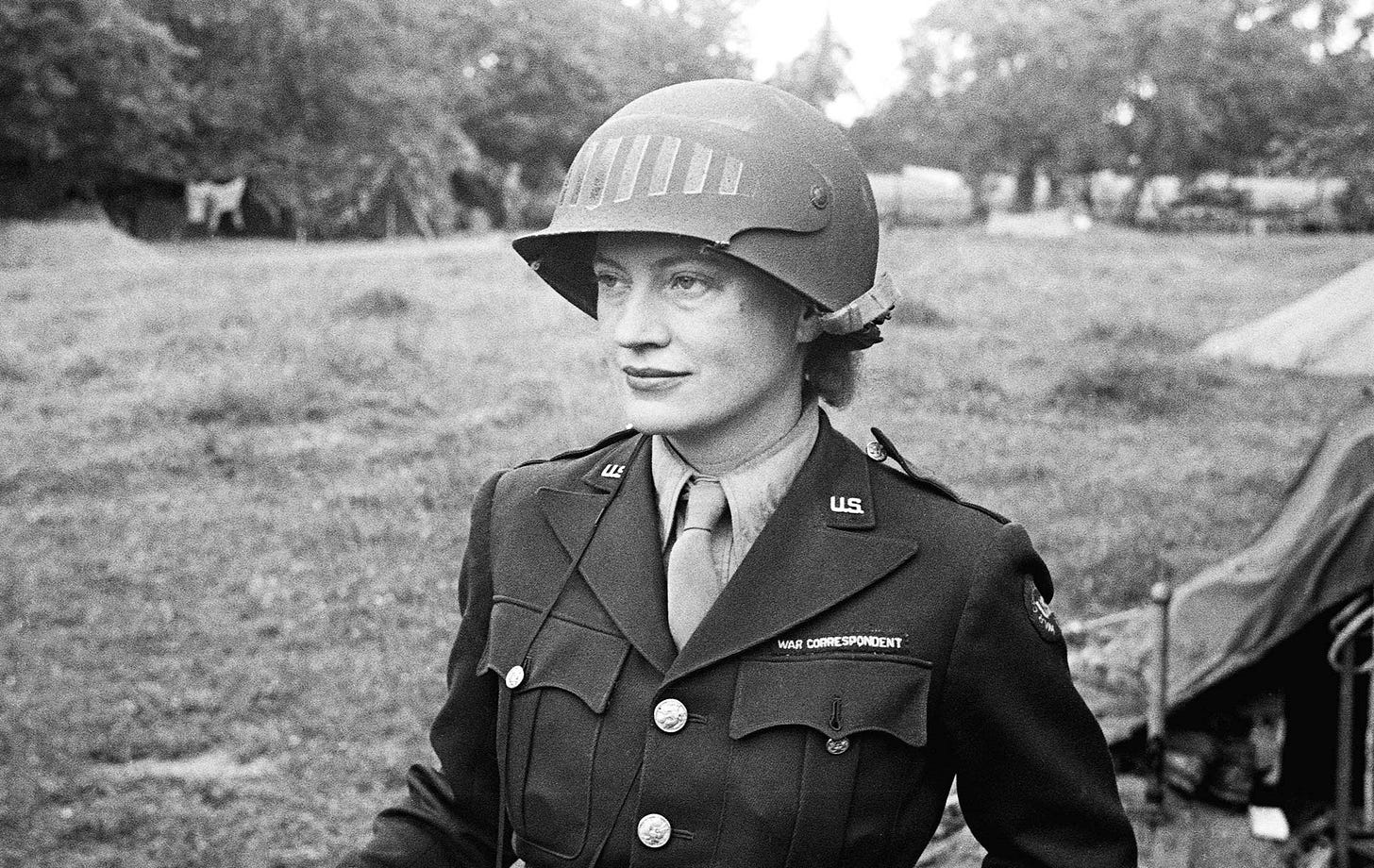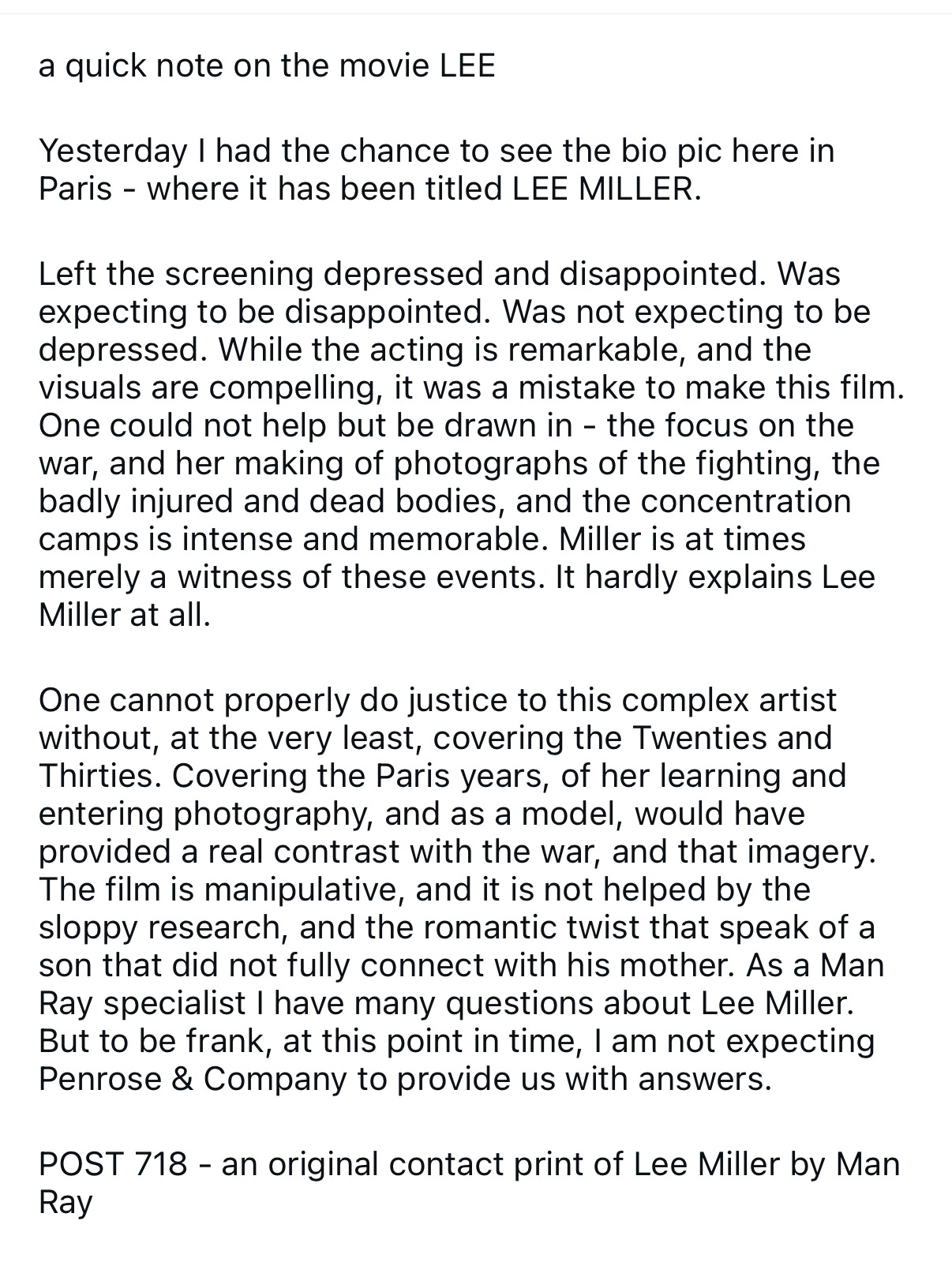lee miller: photojournalist, war correspondent, trailblazer
and the countereffect of the female gaze

admittedly, i shouldn’t have done but i looked for feedback after watching the Lee biopic i very much enjoyed, found the below and became irate—for the arrogance toward and categorical dismissal of women’s work, vision and choices from men that is so endemic in our culture but also because of jim jarmusch’s like of the post which i cropped out as i didn’t want to shame the poster by name. but really, jim jarmusch?!
maybe as a man ray specialist this critic should stick to what he knows and what interests him since, apparently, one of the most interesting, talented and pioneering photographers and war correspondents ever—who just happened to be female and fought to be sent to the front, where women were not allowed, in order to work and document the reality of the war, post-war period and the concentration camps— is too depressing for him to pay attention to the storyline and learn anything about lee miller’s life and work (though had the film focused on her brief, early years modeling and as man ray’s girlfriend and how their work together furthered her photography- for narrative contrast from the bleakness of the war- this would have made for a compelling film and satisfying storytelling). seriously, enough with this bullshit, which i think has become the current, mounting and universal outcry, as women have collectively had it with all the pervasive misogyny, ignorance, marginalization, and objectification to last about twelve million lifetimes.
reading this post and hearing kate winslet talk in interviews about people’s hypocrisy—how brave people told her she was for her lack of makeup, naturalism and nude scenes reminded me of when dangerous liaisons came out and uma thurman frustratedly snarled at a reporter at a press conference, “this movie is not about my tits!” winslet has repeatedly expressed her shock at how when she first googled lee miller what came up was “muse to man ray and vogue model,” and her indignation that society would “never define a man in terms of his love life.” she’s also spoken at length about how the harassment and misogyny she has personally experienced in part fueled her passion to tell lee’s story, to the extent that she self-funded the project when funding at one point ran out. for anyone interested in the movie’s backstory, how winslet first learned of lee and her meticulous research, dedication and partnership with the archives created by lee’s son, anthony— spanning nearly a decade—this is a really good overview of the collaborative arc of the film and her core team:
there are so many beautiful moments in Lee and i genuinely hope more people will watch it now that it’s widely available online and streaming. it is a film of such subtlety and interiority in an effort to contextualize and authentically capture lee miller’s amazing courage, leadership, empathy, talent, and sense of justice that drove and inspired her work. it isn’t overstatement to suggest this is a rendering of a storyline that could only be produced by a woman or women, in this case, as there is such a feeling of care and sensitivity in the acting, script and cinematography to faithfully portray this artist in her own terms. i have the strong impression that winslet was determined that lee would not be presented as a victim whatsoever, because lee didn’t view herself as such. she wanted to be assessed and valued for her work, to be of use in a way that she felt was critical for her time despite the risks she had to take and the relationships and community she left behind, and what she was willing to endure in order to get the photographs no one else would or could. to force people to bear witness to these impossible scenes of humanity, herself included, ultimately resulting in the ptsd she suffered after returning home.
i am left with the feeling that winslet created this film out of a profound sense of respect for and desire to honor the protagonist, with all her complications and dimensions, to render the whole human and let us see the strivings, failings and triumphs: her early years at vogue working to build a career as a fashion photographer but incorporating her years as a surrealist and techniques she helped invent; her relationships and partnerships with roland penrose which brought her to london and with audrey withers at vogue that changed the trajectory of her work and which she leveraged to receive accreditation with the US Army to get her sent to the front; her ambitiousness and sense of purpose that led her to abandon her success for more satisfying and meaningful work, trading the fashion world to become a war correspondent; her tenacity and courage, putting her own life and mental health in jeopardy to get photographs of the siege of st. malo, D-Day, the liberation of Paris, visiting Buchenwald and Dachau concentration camps; her empathy for and humility with the war victims, especially women and children who had been brutalized; after the war, her depression, alcoholism and her failings as a mother to her son; her abandonment of photography and what happened with her unpublished photos.
despite my semesters of art history, i had learned next to nothing of lee miller prior to seeing this movie. i am grateful kate winslet took it upon herself to change that and to indelibly etch a name and narrative onto the photos i did recognize. while the subject matter is harrowing at times, the subject, herself, is nothing if not inspiring, fascinating, and singular. this film is an amazing story of resilience and self-determination and there’s a lot more to be learned from the archives and film i won’t reveal here. her life was simply extraordinary, even seeing only this sliver of it.





I loved this movie so much. What an incredible woman Lee was!
*adds to must watch list